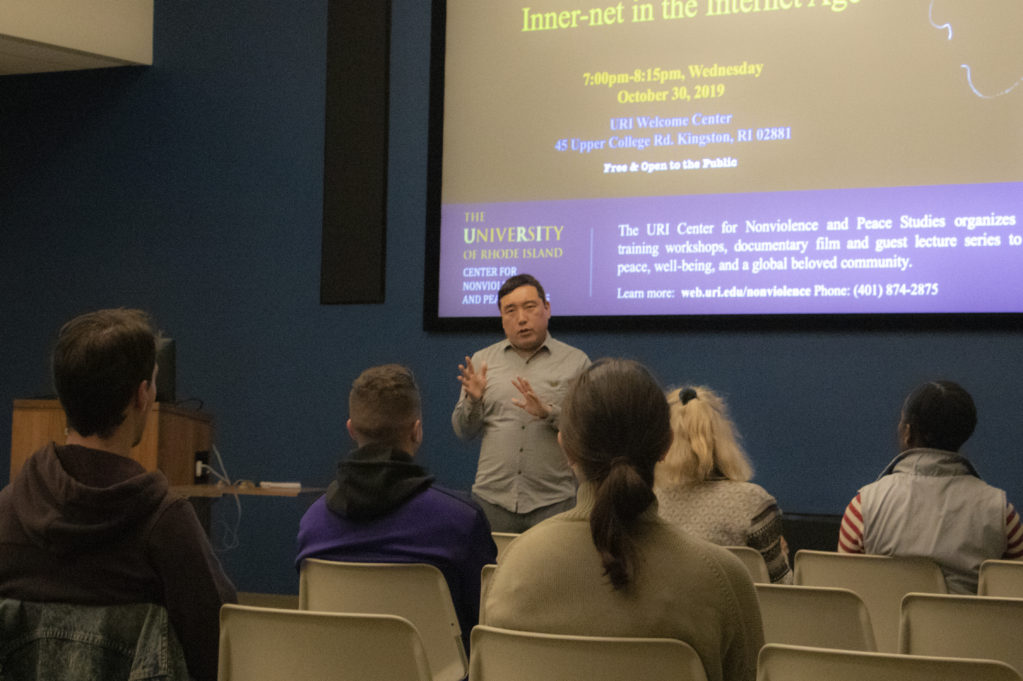Dr. Thupten Tendhar discussed how the use of technology is changing the way people interact with each other. Photo by Greg Clark.
“We have a big campus, we have big houses, but the space in the human heart may be shrinking.”
These were the words of Dr. Thupten Tendhar during his lecture this past Wednesday in the Robert J. Higgins Welcome Center. Tendhar is a former Tibetan monk and the current Inner Peace Program Coordinator at the University of Rhode Island’s Peace and Nonviolence Center.
The lecture, titled “BEING HUMAN: Evolving Inner-net in the Internet Age,” was held to debrief a TED Talk and discuss negative human evolution in the modern era.
The TED Talk, entitled “What one skill [equals] an awesome life?” was given by Harvard-trained psychiatrist Dr. Shimi King.
King said that the key to an awesome life is not found in having a good childhood or having grit, but rather it is the characteristic of adaptability. King described the process of adapting to increasingly busy lives in three steps known. These three steps are known are play, others and downtime (POD).
At the conclusion of the TED Talk, which was shown on video, Tendhar shared his thoughts on adaptability, POD and what they mean in today’s society.
“To adapt to this internet age is not to get too overwhelmed,” he said. “We forget that technologies are used for our comfort and we are acting as if we are made for the comfort of technology.”
In describing POD, Tendhar’s message was to take things less seriously in life, to become more connected with one another through the internet and to take the time to relax and engage in self observance.
The lecture then addressed the broader conversation about what it means to be a human being. Tendhar gave the audience a chance to reflect silently for a few moments about what the question meant to them.
A question and answer session then began with Gianna Chaves, a student in the audience, asking, “how do you go about your life seeing it as something not to be taken too seriously?”
Tendhar responded to Chaves by saying that one must balance caring about what goes on in their lives with learning not to get overwhelmed.
“Don’t be too obsessive and don’t be too negligent, in the middle there is caring but letting go of things,” Tendhar said. “When things do not go as we wanted, many people get struck with ‘I wasn’t smart enough’ or I wasn’t this and this. So they are stuck in a judgemental sense that burdens their mind, it sort of drowns them. That is where the sense of humor comes in. We can certainly learn things to do better, but don’t be too serious about what happened.”
Sam Eleutrio, another student in attendance, asked Tendhar,“What can we do to cultivate more downtime?”
Tendhar responded to Eleutrio by saying even a small amount of downtime can be beneficial.
“Even if you are doing something physically, like running, if you are able to keep you mind in a peaceful calm state, then you are in downtime,” Tendhar replied. “It doesn’t need to be a significant period of time. Suppose we are studying for an exam for two hours, after 15 minutes we take one minute to break, that is downtime from the exam and even that one minute can have a significant impact on the exam and your life.”
Tendhar works in peace studies related research at URI and teaches HPR 316: Tibetan Buddhism: Journey to Nirvana. To learn more about Tendhar and his work, he can be found in the Center for Nonviolence and Peace Studies, which is located in Room 202 of the Multicultural Center.

